美语从头学笔记
赖世雄美语从头学初级篇Lesson 36学习笔记
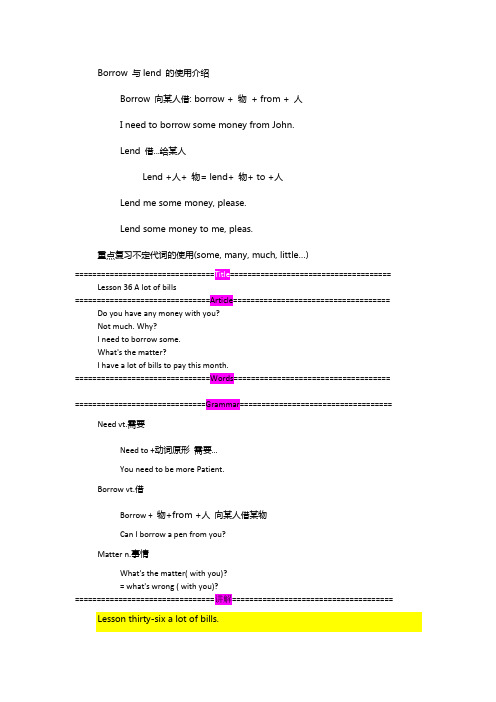
Borrow 与lend 的使用介绍Borrow 向某人借: borrow + 物+ from + 人I need to borrow some money from John.Lend 借...给某人Lend +人+ 物= lend+ 物+ to +人Lend me some money, please.Lend some money to me, pleas.重点复习不定代词的使用(some, many, much, little…)===================================================================== Lesson 36 A lot of bills===============================Article==================================== Do you have any money with you?Not much. Why?I need to borrow some.What's the matter?I have a lot of bills to pay this month.===============================Words==================================== ==============================Grammar=================================== Need vt.需要Need to +动词原形需要…You need to be more Patient.Borrow vt.借Borrow + 物+from +人向某人借某物Can I borrow a pen from you?Matter n.事情What's the matter( with you)?= what's wrong ( with you)?================================讲解===================================== Lesson thirty-six a lot of bills.Hello this is Peter Lai again. Very happy to be on the air. Now let's open this book to page one hundred fifty-seven. Page one hundred fifty-seven on this page we can see lesson thirty-six "A lot of bills."A lot of 后可以放复数名词或不可数名词.He has a lot of money. I have a lot of time.He has a lot of friends.而否定要用much.He doesn't have much money. = he doesn't have a lot of money.而肯定句尽量用a lot of.否定句用a lot of, much都可以He doesn't have much time. 他没有许多的时间.不要用在肯定句:He has much time. He has much money. 错错错.Much 多与not 并用在否定句中Bill 是可数名词" 账单"A bill. Two bills. Many bills.Part on reading.I feel sorry for Al. 我对al表示难过.This is a dialog between a boy by the name of Al and a girl by the name of Sue. Al 和Sue的对话.Al doesn't have much money. I feel sorry for him.他钱不多,我为他感觉难过.I feel sorry for you, John. 我为你感到难过.Do you have any money with you?any用在否定句或疑问句中后放可数不可数名词. 同时放单数,复数都可Do you have any friend/ friends?No, I have no friend/ friends. No后也是可以放单数或复数名词Yes, I do. Have ten dollars with me. 我有10块钱(在身上)With 在be动词后也有用法.She is with Peter now. 他现在跟皮特在一起. (这表示他以前和别人一起的). Now she is with Peter.I don't like to be with him. 我不喜欢和他一起.He doesn't study, he is not a good student. I don't like to be withhim. 他不是五道杠学生,我不喜欢和他一起.How much money do you have with you? 你有多少钱在身上?much用于不可数,many用于可数.How many friends do you have? (没有with you)你有多少朋友?I have twenty dollars with me. 我身上有20块钱.Not much. Why?Yes, I do. But I don't have much money with me. 这简化出来的.Do you have any friends? 你有没有朋友啊?Yes, I do, but I do not have many friends. 我有但不多.Why do you ask me such a question? 你为什么问这狗屁问题?Why 也等于what for.I need to borrow some.Need 的用法之前有介绍过,与want 差不多.我们来复习一下Need to +动词原形. You need to be more careful.你需要更小心.Need +人/物: I need you.我需要你. I need some food.Need + 人+ to +动词原形:I need you to go away.我要你滚蛋.还有need与want的分别记得吗?Need 翻译: 需要(更强烈). Want 翻译: 想要(无可无不可). 在一些情况下可相互代用.I need to 在这等于I want toI want to borrow some.I need to write a letter. I want to write a letter.Borrow 借Borrow +物+ from +人I need to borrow twenty dollars from him.我要跟他借20块.Don't borrow money from him. 不要向他借钱.Lend. 把……借给…Lend + 人+ 物(这有点像授予动词吧)= Lend +物+ to +人不要借钱给他(他从来不还的)Don't lend him any money.Don't lend any money to him.原句写的borrow some 是省略,原句应该是:I need to borrow some money from you.What's the matter?matter在这虽然是名词,但当成形容词用.= wrong.You are wrong. You give me the wrong answer.你错了,你给了我错误的回答.Two and two are four.You are right. 你太聪明了.What's the matter? = what's wrong?What's wrong? Lady.There is nothing wrong/ (the matter).nothing大家还记得: 他的形容词要放后面修饰.这里一样可以放the matter.证明看起来是个名词,实际当形容词用.There's nothing wrong with me.我没问题.他出什么问题了: there is something wrong with him.There is something the matter with him.I have a lot of bills to pay this month.时间副词:To pay this month.看起来好像是: 付这个月. 其实不是This month虽然也是个名词样,但当成时间副词用的. 也可以放在句首This month I have a lot of bills to pay.This +时间名词前面都不需要加介词 .I'll be very busy this week. 这个星期我会很忙.This year I'll be very busy. 今年我会很忙.(这下完了)Pay 支付You should pay the money.你要付这笔钱.You should pay the bill. 你要付这个账单 .轮到你付账了It is your turn. 轮到你啦.It's your turn to pay the bill.练习:Marry is crying.What's the matter with her?What's wrong with her?She doesn't have money.She doesn't have much money.Can you lend me ten dollars?Can you lend ten dollars to me?Don't borrow any money from him.===============================Practice=================================== 这里主要复习不定代词There are ____ pencils on the table.A few, much, little, a little.这里很明显,pencils是复数,所以一下就排队了3个Much 很多. 修饰不可数. 而且用于否定句.Little 没有多少.修饰不可数A little, 有一些. 同样修饰不可数There is little time left. 没剩下多少时间了.There is still a little time. 还有点时间.Few,修饰可数, 没多少A few 有一些, 修饰可数我有一些朋友: I have a few friends.我没几个朋友: I have few friends.We need ____ food for the party.Many, several, a lot, lots of.Many 很多, 修饰可数Several 一些,修饰可数记得课文吗: there are several foreign students in my classA lot of, 很多, 修饰可数不可数Lots of, 就等于a lot of. 但注意看,这里面的选择,没有of.He has a lot of friends. == he has lots of friends.He has a lot of money. == he has lots of money.How ____ students are in the room?Much, few, many, a few.这里how开头表示多少的的疑问句,只有how much/ how many而much问不可数,many 用在可数,所以...There is ____ juice in the refrigerator.Lots, a little, a lots of, many.上面现在都解释过了,所以接下来的应该会了There are many students in the classroom.There are ____children playing in the yard.A little, much, several, severals.There is something ____ with Fred.Matter, the matter, the wrong, what's wrong.这里复习the matter, wrong的使用. wrong是形容词不加冠词================================others===================================。
赖世雄美语从头学之美语音标笔记
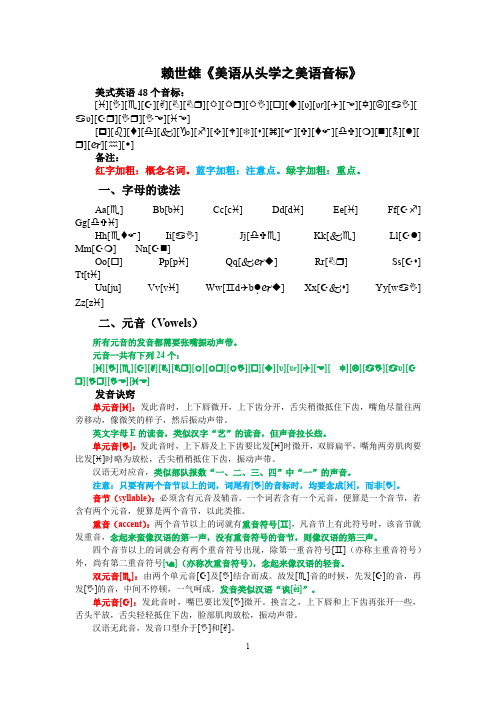
赖世雄《美语从头学之美语音标》美式英语48个音标:[♓][✋][♏][☪][✌][ ][ ❒][ ][ ❒][ ✋][☐][◆][υ][υr][✈][☜][✡][☹][♋✋][♋υ][☪❒][✋❒][✋☜][♓☜][☐][♌][♦][♎][ ][♑][♐][ ][ ][❆][♦][ ][☞][✞][♦☞][♎✞][❍][⏹][☠][●][❒][ ][♒][♦]备注:红字加粗:概念名词。
蓝字加粗:注意点。
绿字加粗:重点。
一、字母的读法Aa[♏] Bb[b♓] Cc[c♓] Dd[d♓] Ee[♓] Ff[☪♐] Gg[♎✞♓]Hh[♏♦☞] Ii[♋✋] Jj[♎✞♏] Kk[ ♏] Ll[☪●] Mm[☪❍] Nn[☪⏹]Oo[☐] Pp[p♓] Qq[ ◆] Rr[ ❒] Ss[☪♦] Tt[t♓]Uu[ju] Vv[v♓] Ww[♊d✈b●. ◆] Xx[☪♦] Yy[w♋✋] Zz[z♓]二、元音(Vowels)所有元音的发音都需要张嘴振动声带。
元音一共有下列24个:[♓][✋][♏][☪][✌][ ][ ❒][ ][ ❒][ ✋][☐][◆][υ][υr][✈][☜][ ✡][☹][♋✋][♋υ][☪❒][✋❒][✋☜][♓☜]发音诀窍单元音[♓]:发此音时,上下唇微开,上下齿分开,舌尖稍微抵住下齿,嘴角尽量往两旁移动,像微笑的样子,然后振动声带。
英文字母E的读音,类似汉字“艺”的读音,但声音拉长些。
单元音[✋]:发此音时,上下唇及上下齿要比发[♓]时微开,双唇扁平,嘴角两旁肌肉要比发[♓]时略为放松,舌尖稍稍抵住下齿,振动声带。
汉语无对应音,类似部队报数“一、二、三、四”中“一”的声音。
注意:只要有两个音节以上的词,词尾有[✋]的音标时,均要念成[♓],而非[✋]。
音节(syllable):必须含有元音及辅音。
一个词若含有一个元音,便算是一个音节,若含有两个元音,便算是两个音节,以此类推。
赖世雄美语入门学习笔记
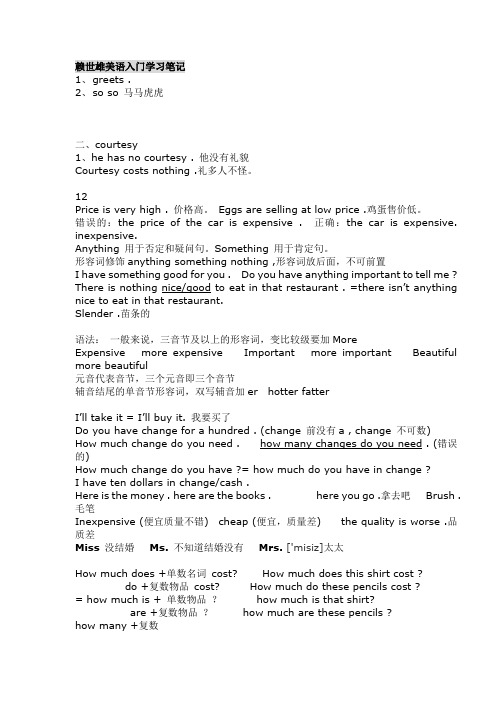
赖世雄美语入门学习笔记1、greets .2、so so 马马虎虎二、courtesy1、he has no courtesy . 他没有礼貌Courtesy costs nothing .礼多人不怪。
12Price is very high . 价格高。
Eggs are selling at low price .鸡蛋售价低。
错误的:the price of the car is expensive . 正确:the car is expensive. inexpensive.Anything 用于否定和疑问句。
Something 用于肯定句。
形容词修饰anything something nothing ,形容词放后面,不可前置I have something good for you . Do you have anything important to tell me ? There is nothing nice/good to eat in that restaurant . =there isn’t anything nice to eat in that restaurant.Slender .苗条的语法:一般来说,三音节及以上的形容词,变比较级要加MoreExpensive more expensive Important more important Beautiful more beautiful元音代表音节,三个元音即三个音节辅音结尾的单音节形容词,双写辅音加er hotter fatterI’ll take it = I’ll buy it. 我要买了Do you have change for a hundred . (change 前没有a , change 不可数) How much change do you need . how many changes do you need . (错误的)How much change do you have ?= how much do you have in change ?I have ten dollars in change/cash .Here is the money . here are the books . here you go .拿去吧Brush .毛笔Inexpensive (便宜质量不错) cheap (便宜,质量差) the quality is worse .品质差Miss没结婚Ms. 不知道结婚没有Mrs.['misiz]太太How much does +单数名词cost? How much does this shirt cost ?do +复数物品cost? How much do these pencils cost ?= how much is + 单数物品?how much is that shirt?are +复数物品?how much are these pencils ?how many +复数13课Hostess 女服务员I’d like to book(reserve) a table for seven. 订桌子(门票通常用reserve)Do you have a table for two ? =do you have a table for two people.有两个人的桌子么May I have the menu .我能看菜单么。
赖世雄初级美语入门
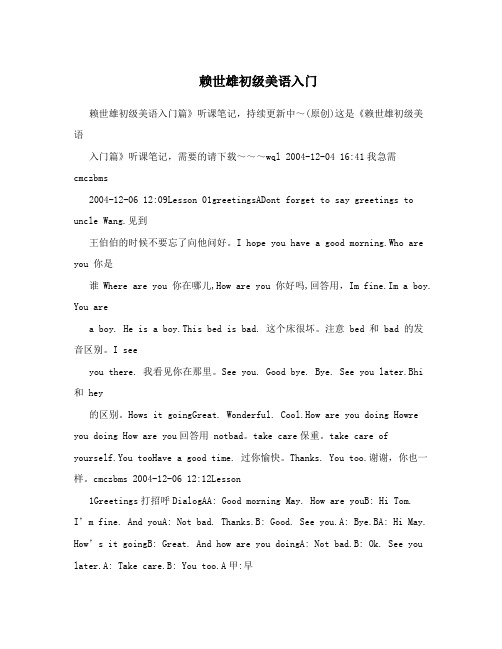
赖世雄初级美语入门赖世雄初级美语入门篇》听课笔记,持续更新中~(原创)这是《赖世雄初级美语入门篇》听课笔记,需要的请下载~~~wql 2004-12-04 16:41我急需cmczbms2004-12-06 12:09Lesson 01greetingsADont forget to say greetings to uncle Wang.见到王伯伯的时候不要忘了向他问好。
I hope you have a good morning.Who are you 你是谁Where are you 你在哪儿,How are you 你好吗,回答用,Im fine.Im a boy. You area boy. He is a boy.This bed is bad. 这个床很坏。
注意 bed 和 bad 的发音区别。
I seeyou there. 我看见你在那里。
See you. Good bye. Bye. See you later.Bhi 和 hey的区别。
Hows it goingGreat. Wonderful. Cool.How are you doing Howre you doing How are you回答用 notbad。
take care保重。
take care of yourself.You tooHave a good time. 过你愉快。
Thanks. You too.谢谢,你也一样。
cmczbms 2004-12-06 12:12Lesson1Greetings打招呼DialogAA: Good morning May. How are youB: Hi Tom.I’m fine. And youA: Not bad. Thanks.B: Good. Se e you.A: Bye.BA: Hi May. How’s it goingB: Great. And how are you doingA: Not bad.B: Ok. See you later.A: Take care.B: You too.A甲:早啊,小梅。
赖世雄美语从头学初级篇Lesson 8学习笔记
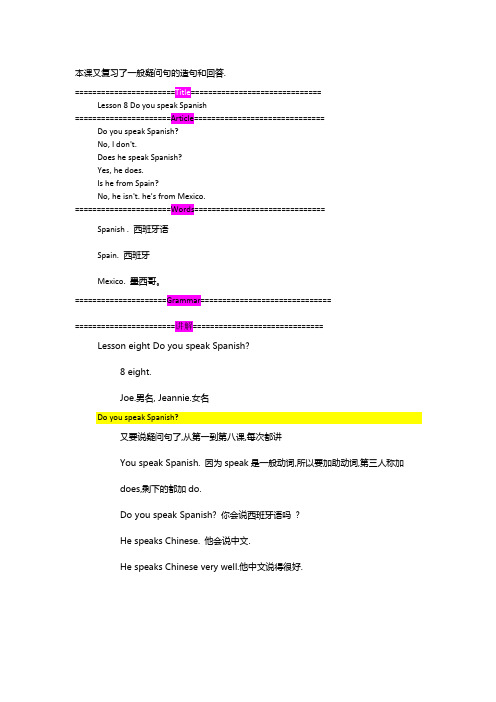
本课又复习了一般疑问句的造句和回答.=====================================================Lesson 8 Do you speak Spanish======================Article==============================Do you speak Spanish?No, I don't.Does he speak Spanish?Yes, he does.Is he from Spain?No, he isn't. he's from Mexico.======================Words==============================Spanish . 西班牙语Spain. 西班牙Mexico. 墨西哥。
=====================Grammar=====================================================讲解==============================Lesson eight Do you speak Spanish?8 eight.Joe.男名, Jeannie.女名Do you speak Spanish?又要说疑问句了,从第一到第八课,每次都讲You speak Spanish. 因为speak是一般动词,所以要加助动词,第三人称加does,剩下的都加do.Do you speak Spanish? 你会说西班牙语吗?He speaks Chinese. 他会说中文.He speaks Chinese very well.他中文说得很好.变成问句: does he speak Chinese? 中间有两处变化,第一是加了助动词,因为he是第三人称单数.第二个是speaks变成了speak因为之前有助动词,所以speak还原.No, I don't.No, I don't speak Spanish. 这里缩写了(真实用法都缩写)肯定回答: yes, I do. 这里回答人家说do,你也回do,人家说does,你也回does.live住He lives here.(因为he是第三人称单数,所以用lives)改疑问句: does he live here?我说得太多了接下来实在不愿意再说了,如果你从第一课到现在都看,那你一定明白为什么.Do you live here? 你住在这里吗?He has a bicycle. 他有自行车.(之前讲there is/are的时候说过,have是表示动物有什么东西.第三人称用has.英语中永远逃不了的第三人称单数的用法)I have a bicycle.我有自行车.You have a bicycle.你有自行车.你有自行车吗? Do you have a bicycle? Yes, I do.我有自行车吗? Do I have a bicycle? No, I don't.他有自行车吗? Does he have a bicycle? (has变成了have,同样又是因为前面有助动词影响)Does he speak Spanish?如果是陈述句: he speaks Spanish.他会说西班牙语.speaks又是第三人称单数,而改成疑问句,又是does第三人称单数的问题,我实在不想重复了.Yes, he does.如果否定: no, he doesn't.Is he from Spain?be动词造句: 上一课讲过之前也讲过,这次又来复习:就是把be动词和主语倒装就好了.She is beautiful. Is he beautiful?她漂亮. 她漂亮吗?这些都是用是否回答的叫一般疑问句.语调要上扬.He is from Guangdong. 他是广东人.Is he from Guangdong? 他是广东人吗?He comes from Guangdong. 他是广东人?Does he come from Guangdong? 他是广东人吗?You are from Beijing. 你是北京猿人.Are you from Beijing? 你是北京猿人吗?Yes I am.我是北京猿人. No, I am not. I from Mars.不,我不是,我是火星人.Do you come from Beijing?Spain 西班牙(国家) Spanish 西班牙文.No, he isn't. He’s from Mexico.He's 就是he is的缩写.Mexico.墨西哥.如果用come造句:Does he come from Spain?No, he comes from Mexico.======================Practice==============================Bob and Carl are brothers, but they ____ different. Bob ____quiet. Carl ____. Carlwatches TV. Bob____. Bob reads books. Carl ____. Bob and ____teacher are friends. Carl and ____ teacher ____.Perhaps Bob is an older brother, and Carl is a younger brother.也许Bob是哥哥, Carl是弟弟在翻译中,如果be动词后是名词,那就翻译是He is a student. 他是学生.而be动词后是形容词那就不翻译出来She is beautiful. 她漂亮.不要说她是漂亮的.TV就是电视,television的缩写这上面的填空都没有超编,如果前面的课程有认真学过一定能做出来,不是特别难.。
赖世雄美语从头学-入门篇
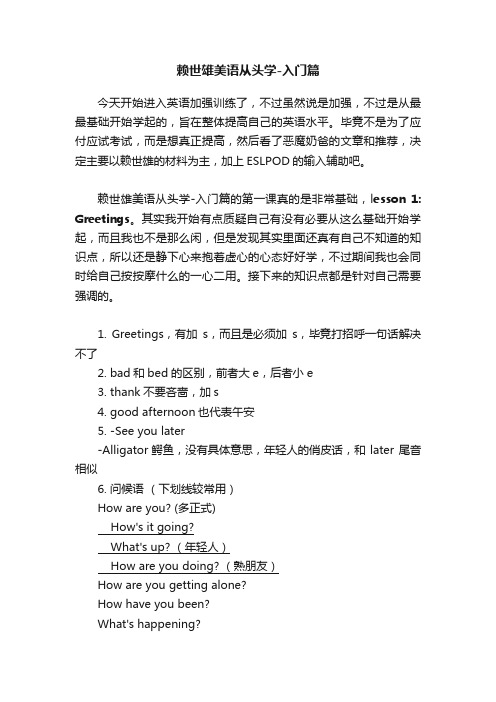
赖世雄美语从头学-入门篇今天开始进入英语加强训练了,不过虽然说是加强,不过是从最最基础开始学起的,旨在整体提高自己的英语水平。
毕竟不是为了应付应试考试,而是想真正提高,然后看了恶魔奶爸的文章和推荐,决定主要以赖世雄的材料为主,加上ESLPOD的输入辅助吧。
赖世雄美语从头学-入门篇的第一课真的是非常基础,lesson 1: Greetings。
其实我开始有点质疑自己有没有必要从这么基础开始学起,而且我也不是那么闲,但是发现其实里面还真有自己不知道的知识点,所以还是静下心来抱着虚心的心态好好学,不过期间我也会同时给自己按按摩什么的一心二用。
接下来的知识点都是针对自己需要强调的。
1. Greetings,有加s,而且是必须加s,毕竟打招呼一句话解决不了2. bad和bed的区别,前者大e,后者小e3. thank不要吝啬,加s4. good afternoon也代表午安5. -See you later-Alligator 鳄鱼,没有具体意思,年轻人的俏皮话,和later尾音相似6. 问候语(下划线较常用)How are you? (多正式)How's it going?What's up? (年轻人)How are you doing? (熟朋友)How are you getting alone?How have you been?What's happening?7. 问候答句区别a. 都有youHow are you?=How are you doing?=How are you getting alone?answer:I'm fine, thank you. (跟fine有关的回答持保留意见,比较多说法是一般不用fine这种回答,我个人听到最多的就是good) Fine, thanks.Great, thanks.Not bad, thanks.So-so, thank you.b. How have you been?这个问法是完成时,所以不能用amanswer:I have been fine, thank you.Fine, thank you.c. How's it going?answer: Not bad, thank you.So-so, thank you.Great, thank you.Fine, thank you.d. What's up/What's happening?answer: Nothing much.Same as usual.8. 感谢Thanks a lot. (非正式)Thanks a million (俏皮话)Lesson 2 Courtesy (礼貌)Idiom: Courtesy costs nothing. 礼貌不花钱;礼多人不怪。
美语从头学笔记重点讲义资料

《美语从头学·入门篇》笔记Lesson 1 Greetings 打招呼 (1)Lesson 2 Courtesy 礼貌 (3)Lesson 3 Name,Age and Nationality 姓名、年龄和国籍 (5)Lesson 4 Introductions 介绍 (7)Lesson 5 Occupations 职业 (8)Lesson 6 Time 时间 (10)Lesson 1 Greetings打招呼Ⅰ.Dialog 会话Dialog AA:Good morning,May.How are you?B:Hi,Tom.I'm fine.And you?A:Not bad.Thanks.B:Good.See you.A:Bye.甲:早啊,小梅。
你好吗?乙:嗨,汤姆。
我很好,你呢?甲:还不错,谢了。
乙:很好,再见。
甲:再见。
Dialog BA:Hi,May.How's it going?B:Great.And how are you doing?A:Not bad.B:Ok.See you later.A:Take care.B:You too.甲:嗨,小梅。
近来如何?乙:很好,那你呢?甲:还不错。
乙:好吧,再见。
甲:保重。
乙:你也是。
★1.GreetingsGreetings这个词是复数n.问候招呼致意Don't forget to say greetings to uncle Wang.★2.Dialog 会话★3.Good morning Good morning=I hope you have a good morning.★4.badBad 坏Bed 床This bed is bad.这张床坏了。
★5.Thanks这个词是复数★6.HiHi≈Hey。
Hey不礼貌。
★7.Great=wonderful=coolⅡ.Vocabulary﹠Idioms 单词短语注解★1.good morninggood morning--good afternoon--good evening晚上好Good night 晚安、再见≠good evening★2.It's a fine day today.今天天气不错。
(完整word版)赖世雄美语从头学初级篇Lesson31学习笔记
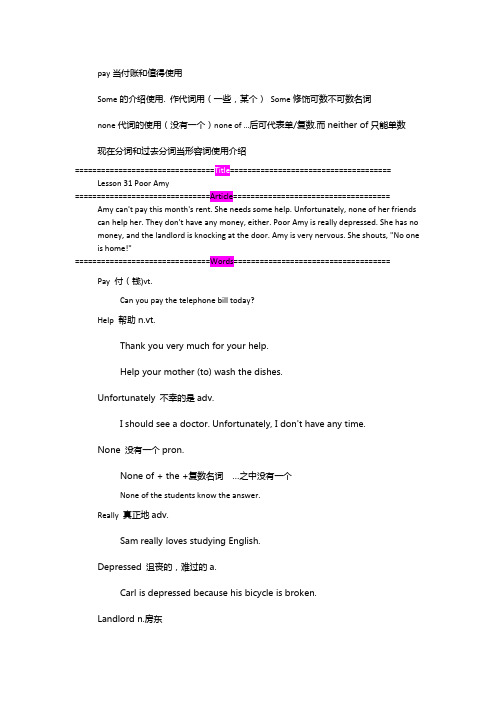
pay当付账和值得使用Some的介绍使用. 作代词用(一些,某个)Some修饰可数不可数名词none代词的使用(没有一个)none of …后可代表单/复数.而neither of只能单数现在分词和过去分词当形容词使用介绍===================================================================== Lesson 31 Poor Amy===============================Article==================================== Amy can't pay this month's rent. She needs some help. Unfortunately, none of her friends can help her. They don't have any money, either. Poor Amy is really depressed. She has no money, and the landlord is knocking at the door. Amy is very nervous. She shouts, "No one is home!"===============================Words==================================== Pay 付(钱)vt.Can you pay the telephone bill today?Help 帮助n.vt.Thank you very much for your help.Help your mother (to) wash the dishes.Unfortunately 不幸的是adv.I should see a doctor. Unfortunately, I don't have any time.None 没有一个pron.None of + the +复数名词…之中没有一个None of the students know the answer.Really 真正地adv.Sam really loves studying English.Depressed 沮丧的,难过的a.Carl is depressed because his bicycle is broken.Landlord n.房东Tenant n.租客Knock 敲(门)vi.Knock the door 错Knock at the door对Nervous 紧张的a.Exams make me very nervous.Shout vt.高呼,大声说出My teacher often shouts, "shut up!" when we are noisy.==============================Grammar=================================== 形容词some,及代词none的用法Some 用法She needs some help.此处some为形容词,表示“一些”。
- 1、下载文档前请自行甄别文档内容的完整性,平台不提供额外的编辑、内容补充、找答案等附加服务。
- 2、"仅部分预览"的文档,不可在线预览部分如存在完整性等问题,可反馈申请退款(可完整预览的文档不适用该条件!)。
- 3、如文档侵犯您的权益,请联系客服反馈,我们会尽快为您处理(人工客服工作时间:9:00-18:30)。
《美语从头学·入门篇》笔记Lesson 1 Greetings 打招呼 (1)Lesson 2 Courtesy 礼貌 (3)Lesson 3 Name,Age and Nationality 姓名、年龄和国籍 (5)Lesson 4 Introductions 介绍 (7)Lesson 5 Occupations 职业 (8)Lesson 6 Time 时间 (10)Lesson 1 Greetings打招呼Ⅰ.Dialog 会话Dialog AA:Good morning,May.How are you?B:Hi,Tom.I'm fine.And you?A:Not bad.Thanks.B:Good.See you.A:Bye.甲:早啊,小梅。
你好吗?乙:嗨,汤姆。
我很好,你呢?甲:还不错,谢了。
乙:很好,再见。
甲:再见。
Dialog BA:Hi,May.How's it going?B:Great.And how are you doing?A:Not bad.B:Ok.See you later.A:Take care.B:You too.甲:嗨,小梅。
近来如何?乙:很好,那你呢?甲:还不错。
乙:好吧,再见。
甲:保重。
乙:你也是。
★1.GreetingsGreetings这个词是复数n.问候招呼致意Don't forget to say greetings to uncle Wang.★2.Dialog 会话★3.Good morning Good morning=I hope you have a good morning.★4.badBad 坏Bed 床This bed is bad.这张床坏了。
★5.Thanks这个词是复数★6.HiHi≈Hey。
Hey不礼貌。
★7.Great=wonderful=coolⅡ.Vocabulary﹠Idioms 单词短语注解★1.good morninggood morning--good afternoon--good evening晚上好Good night 晚安、再见≠good evening★2.It's a fine day today.今天天气不错。
Ⅲ.Grammar Notes 语法重点★1.good morning 早安(见面时使用)Good afternoon 午安(见面时使用)Good evening 晚安(见面时使用)Good night 晚安(道别时使用)★2.再见Goodbye、bye、see you later、see you、see you tomorrow.★★3.注意下列问候语的区别:①How are you?你好吗?(多用于正式场合)②How are you doing?你好吗?(多用于熟朋友之间)③How are you getting along?你好吗?④How have you been?你最近还好吗/近况如何?⑤How's it going?还好吧/近况如何?⑥What's up?近况如何?(多为年轻人所用)⑦What's happening?近况如何?(=What's up?)★★4.注意下列的答句:▲A.上列问候语中,前三个问句均有you,故可使用下列答句:问句:How are you?你好吗?=How are you doing?=How are you getting along?答句:I'm fine,thank you.我很好,谢谢你 Great,thanks.很好,谢谢你。
Fine,thanks.不错,谢谢你。
Not bad,thanks.还不错,谢谢你。
So-so,thank you.马马虎虎/还过得去,谢谢你。
▲B.“How have you been?”是“How are you?”的完成式,故答句不可说“I'm fine,thank you.”或“I am fine,thank you.”而要说“I have been fine,thank you.”或“Fine,thank you.”▲C.问候句“How's it going?”、“What's up?”、“What's happening?”的主语并非you,故答句不可说“I'm fine,thank you.”兹分述如下:问句:How's it going?还好吧/近况如何?答句:Great,thank you.很好,谢谢你。
Fine,thank you.不错,谢谢你。
Not bad,thanks.还不错,谢谢你。
So-so,thank you.马马虎虎/还过得去,谢谢你。
问句:What's up?、What's happening?近况如何?答句:Nothing much.没什么。
Same as usual.老样子。
★5.表示“感谢”的用语:Thanks.Thank you.Thank you very much.Thanks a lot.Thanks a million.(谢谢你一般万次) Ⅳ.Substitution 替换★1.How are you?=How are you doing?你好吗?★2.And you?=What about you?=How about you?★3.How's it going?、What's up?、What's happening?近来如何?Ⅴ.Exercises 练习Where there is a will there is a way. 有志者事竟成。
Lesson 2 Courtesy 礼貌Ⅰ.Dialog 会话Dialog AA:Excuese me.Are you Ann?B:No.I'm not.A:I'm sorry.Who's Ann?B:She is.A:Thank you.B:You're welcome.甲:对不起,请问你是安吗?乙:不,我不是。
甲:很抱歉。
请问安是哪位?乙:她是。
甲:谢谢。
乙:不客气。
Dialog BA:Hi,I'm Tom.B:I beg your pardon?A:I'm Tom.B:Oh!Hi,Tom.I'm May.A:Nice to meet you,May.B:Pleased to meet you.甲:嗨,我是汤姆。
乙:对不起,请再说一遍好吗?甲:我是汤姆。
乙:哦!嗨,汤姆。
我是小梅。
甲:很高兴认识你,小梅。
乙:幸会,幸会。
★1.Courtesy costs nothing.礼多人不怪★2.May I beg your pardon?=I beg your pardon?=Pardon?Ⅱ.Vocabulary﹠Idioms 单词短语注解★1.idiot 傻瓜≠idiom短语、成语★2.courtesy 名词礼貌★3.beg 动词请求,恳求。
★4.pardon 名词原谅,宽恕。
Ⅲ.Grammar Notes 语法重点★1.Excuese me.对不起/打扰一下。
I'm sorry.对不起/抱歉。
以上两句均译成“对不起”,但用法有别:“Excuese me”用于唤起别人的注意;而“I'm sorry”则多表示“抱歉”,尤其是在犯错或有不好的消息要告诉对方时使用。
例句:A:Excuese me.Where is the station?B:I'm sorry.I'm new here.注意:“Excuese me”“I'm sorry”之后除可置句点以外,亦可置逗点,再置连接词but,以连接另一个句子。
But原意为“但是”,但此处不必译出。
因此上列例句亦可写成:A:Excuese me,but where is the station?B:I'm sorry,but I'm new here.★2.You're welcome.别客气。
对方表示谢谢时,可用下列句子或用语回答,这些句子或用语均可译成“别客气”:A:Thank you for your help.B:You're welcome.=Don't mention it.=Not at all.=No problem.★3.I beg your pardon?对不起,请再说一遍好吗?May I beg your pardon?=I beg your pardon?=Beg your pardon?=Pardon me?=Pardon?★4.Nice to meet you.很高兴认识你/幸会。
=Pleased to meet you.=Glad to meet you.这三句分别由下列完整的句子简化而成:It's nice to meet you.I'm pleased to meet you.I'm glad to meet you.★4.英文中很多句子都是“代名词+be动词”开头的,但在口语中,常为求说话的速度及口气的自然,经常将其简化。
“代名词+be动词”简化表人称简化前简化后第一人称单数I am(我是)I'm 复数we are(我们是)we're第二人称单数you are(你是)you're 复数you are(你们是)you're第三人称单数he is(他是)he'sshe is(她是)she'sit is(它是)it's复数they are(他/她/它们是)they'reLesson 3 Name,Age and Nationality 姓名、年龄和国籍Ⅰ.Dialog 会话Dialog AA:Excuese me.What’s your name?B:I’m May.A:Hi,May.Where are you from?B:I’m from Hong Kong.What about you?A:I’m from Japan.甲:对不起,请问你叫什么名字?乙:我叫小梅。
甲:嗨,小梅。
你是哪里人?乙:我是香港人。
那你呢?甲:我是日本人。
Dialog BA:May I have your name,please?B:My name is May.A:How old are you?B:I’m twenty-five.A:Where are you from?B:I’m from Hong Kong.甲:请问尊姓大名?乙:我叫小梅。
甲:你几岁了?乙:我25岁。
甲:你是哪里人?乙:我是香港人。
Ⅱ.Vocabulary﹠Idioms 单词短语注解★1.nationality 名国籍★2.what about you?那你呢?And you?你呢?★3.where are you come from? (×)where are you from? (√)where do you come from? (√)where do you from? (×)上面4句话,只有where are you from?和where do you come from?是正确的。
